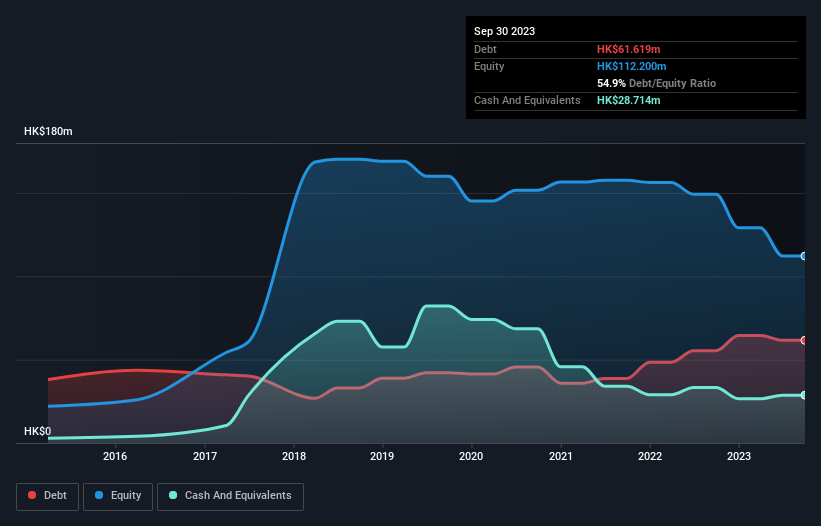- Hong Kong
- /
- Construction
- /
- SEHK:6182
Twintek Investment Holdings (HKG:6182) Is Making Moderate Use Of Debt

Warren Buffett famously said, 'Volatility is far from synonymous with risk.' It's only natural to consider a company's balance sheet when you examine how risky it is, since debt is often involved when a business collapses. We can see that Twintek Investment Holdings Limited (HKG:6182) does use debt in its business. But should shareholders be worried about its use of debt?
Why Does Debt Bring Risk?
Debt is a tool to help businesses grow, but if a business is incapable of paying off its lenders, then it exists at their mercy. Ultimately, if the company can't fulfill its legal obligations to repay debt, shareholders could walk away with nothing. However, a more usual (but still expensive) situation is where a company must dilute shareholders at a cheap share price simply to get debt under control. Of course, debt can be an important tool in businesses, particularly capital heavy businesses. When we examine debt levels, we first consider both cash and debt levels, together.
Check out our latest analysis for Twintek Investment Holdings
What Is Twintek Investment Holdings's Debt?
You can click the graphic below for the historical numbers, but it shows that as of September 2023 Twintek Investment Holdings had HK$61.6m of debt, an increase on HK$55.3m, over one year. On the flip side, it has HK$28.7m in cash leading to net debt of about HK$32.9m.

How Strong Is Twintek Investment Holdings' Balance Sheet?
According to the last reported balance sheet, Twintek Investment Holdings had liabilities of HK$88.3m due within 12 months, and liabilities of HK$551.0k due beyond 12 months. Offsetting this, it had HK$28.7m in cash and HK$104.1m in receivables that were due within 12 months. So it can boast HK$44.0m more liquid assets than total liabilities.
This surplus strongly suggests that Twintek Investment Holdings has a rock-solid balance sheet (and the debt is of no concern whatsoever). With this in mind one could posit that its balance sheet means the company is able to handle some adversity. The balance sheet is clearly the area to focus on when you are analysing debt. But you can't view debt in total isolation; since Twintek Investment Holdings will need earnings to service that debt. So when considering debt, it's definitely worth looking at the earnings trend. Click here for an interactive snapshot.
In the last year Twintek Investment Holdings had a loss before interest and tax, and actually shrunk its revenue by 56%, to HK$128m. That makes us nervous, to say the least.
Caveat Emptor
Not only did Twintek Investment Holdings's revenue slip over the last twelve months, but it also produced negative earnings before interest and tax (EBIT). Its EBIT loss was a whopping HK$34m. Looking on the brighter side, the business has adequate liquid assets, which give it time to grow and develop before its debt becomes a near-term issue. Still, we'd be more encouraged to study the business in depth if it already had some free cash flow. So it seems too risky for our taste. When analysing debt levels, the balance sheet is the obvious place to start. But ultimately, every company can contain risks that exist outside of the balance sheet. Case in point: We've spotted 3 warning signs for Twintek Investment Holdings you should be aware of, and 1 of them can't be ignored.
At the end of the day, it's often better to focus on companies that are free from net debt. You can access our special list of such companies (all with a track record of profit growth). It's free.
Valuation is complex, but we're here to simplify it.
Discover if Twintek Investment Holdings might be undervalued or overvalued with our detailed analysis, featuring fair value estimates, potential risks, dividends, insider trades, and its financial condition.
Access Free AnalysisHave feedback on this article? Concerned about the content? Get in touch with us directly. Alternatively, email editorial-team (at) simplywallst.com.
This article by Simply Wall St is general in nature. We provide commentary based on historical data and analyst forecasts only using an unbiased methodology and our articles are not intended to be financial advice. It does not constitute a recommendation to buy or sell any stock, and does not take account of your objectives, or your financial situation. We aim to bring you long-term focused analysis driven by fundamental data. Note that our analysis may not factor in the latest price-sensitive company announcements or qualitative material. Simply Wall St has no position in any stocks mentioned.
About SEHK:6182
Twintek Investment Holdings
An investment holding company, engages in the sale of building materials; and provision of construction and engineering services in Hong Kong.
Excellent balance sheet and slightly overvalued.
Market Insights
Community Narratives



